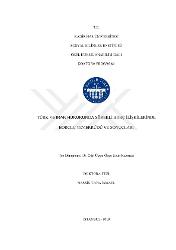| dc.contributor.advisor | Kazmaci, Üyesi Özge Uzun | |
| dc.contributor.author | İsmael, Nassik Taha | |
| dc.date.accessioned | 2023-10-17T20:46:23Z | |
| dc.date.available | 2023-10-17T20:46:23Z | |
| dc.date.issued | 2019 | |
| dc.identifier.uri | https://tez.yok.gov.tr/UlusalTezMerkezi/TezGoster?key=4J_FzTwlrMCH4qBROpXPHzBTE_b2DfD4qwPB-qjzxgaeLw82xEpkIq_OloThGgVP | |
| dc.identifier.uri | https://hdl.handle.net/20.500.12469/4532 | |
| dc.description.abstract | Çalışmamızın amacı; Türk Hukuku ile Irak Hukuku karşılaştırılarak sürekli borç ilişkilerinde borçlunun temerrüdü ve sonuçlarının araştırılmasıdır. Sürekli borç ilişkilerinde borçlunun temerrüde düşmesi hâlinde fesih, TBK m. 126'da düzenlenmiştir. IMK'de ise fesih hükümleri m. 177 'de düzenlenmiş; ama bağımsız bir başlık altında temerrüt konusu düzenlenmemiş, fesih hükümlerinin içinde yer almıştır. TBK hükümlerine göre sürekli borç ilişkilerinde süresi başlamış ya da başlamamış sözleşmelerde borçlunun temerrüde düşmesi ve temerrüdün tüm koşullarının gerçekleşmesi hâlinde; alacaklı, borçlunun temerrüdünün genel sonucu olarak, aynen ifa ve gecikme tazminatı ister veya ifasına başlanmış sözleşmelerde sözleşmeyi feshederek uğradığı olumlu zararın tazminini; ifasına başlanmamış sözleşmelerde ise sözleşmeden dönerek olumsuz zararının tazmini seçme hakkını kullanabilir. Ancak alacaklının aynen ifa ve gecikme tazminatı dışındaki seçimlik haklarını kullanabilmesi, kural olarak, borçluya ek süre verilmesi ve bu süre sonunda hâlen borcun ifa edilmemesi ile mümkündür. Fesih, sürekli sözleşme ilişkisini sona erdirmeye ve ortadan kaldırmaya yönelik olan bozucu yenilik doğuran bir hakkın kullanılması ile gerçekleşen, etkileri ileriye dönük bir hakkın kullanılmasıdır. Fesih beyanı borçluya ulaştığı andan itibaren geçerli olmaktadır. IMK'de ise bu konuda bazı farklar vardır. Borçlunun temerrüde düşmemesi için, önlemeler ve yaptırımlar öngörülmüştür. Alacaklı, fesih hakkını mahkemeye başvurarak kullanır ve hâkim borçlunun durumuna göre takdir yetkisini kullanarak karar verir. | en_US |
| dc.description.abstract | Study Objectıves; Comparison Between Turkish Law and Iraqi Law in case of a default of the borrower in a permanent contract and the determination of its consequences. In case of a debtor's default in a permanent contract, termination is regulated in the article 126 of the Turkish Code of Obligations. Iraqi Civil Law, on the other hand, has been regulated in the article 177 of the termination provisions; however, the issue of default is not regulated under an independent title but as a part of the termination provisions. According to the provisions of the Turkish Code of Obligations, in cases where the debtor is in default in contracts that have started or have not started, and if all the conditions of the default exist; as a general result of the default of the debtor, the creditor may use the right to choose between the specific performance with a delay damages or the compensation of the positive damage or the negative damage that they have suffered as a result of the termination. However, as a rule it is only possible for the creditor to exercise his elective rights, other than the specific performance with a delay demages, by giving the debtor an additional time and only if the debt is still not performed at the end of this period. Termination is the use of a formative right, the effects of which are to terminate and resolve the contractual relationship in a ex nunc manner. The termination notice is valid from the moment it reaches the debtor. There are some differences in this subject in the Iraqi Civil Law. In order to prevent the debtor from default, some measures and sanctions are envisaged. The creditor may use their right of termination by applying to the court and the judge decides with a discretionary power according to the condition of the debtor. | en_US |
| dc.language.iso | tur | en_US |
| dc.publisher | Kadir Has Üniversitesi | en_US |
| dc.rights | info:eu-repo/semantics/openAccess | en_US |
| dc.subject | Hukuk | en_US |
| dc.subject | Law | en_US |
| dc.title | Türk ve Irak hukunda sürekli borç ilişkilerinde borçlu temerrüdü ve sonuçları | en_US |
| dc.title.alternative | Comparison between Turkish law and Iraqi law in case of a default of borrower in a permanent contract and the determination of its consequences | en_US |
| dc.type | doctoralThesis | en_US |
| dc.identifier.startpage | 1 | en_US |
| dc.identifier.endpage | 133 | en_US |
| dc.department | Enstitüler, Lisansüstü Eğitim Enstitüsü, Özel Hukuk Ana Bilim Dalı | en_US |
| dc.institutionauthor | İsmael, Nassik Taha | |
| dc.relation.publicationcategory | Tez | en_US |
| dc.identifier.yoktezid | 611207 | en_US |
| dc.khas | 20231017-Tez | rn_US |
















